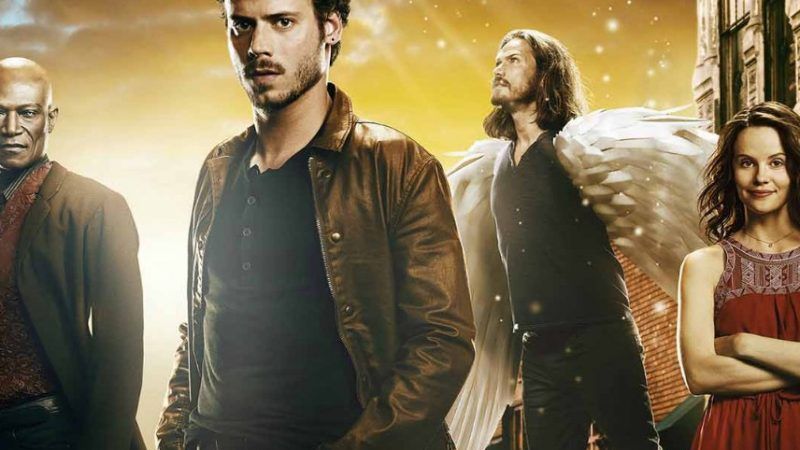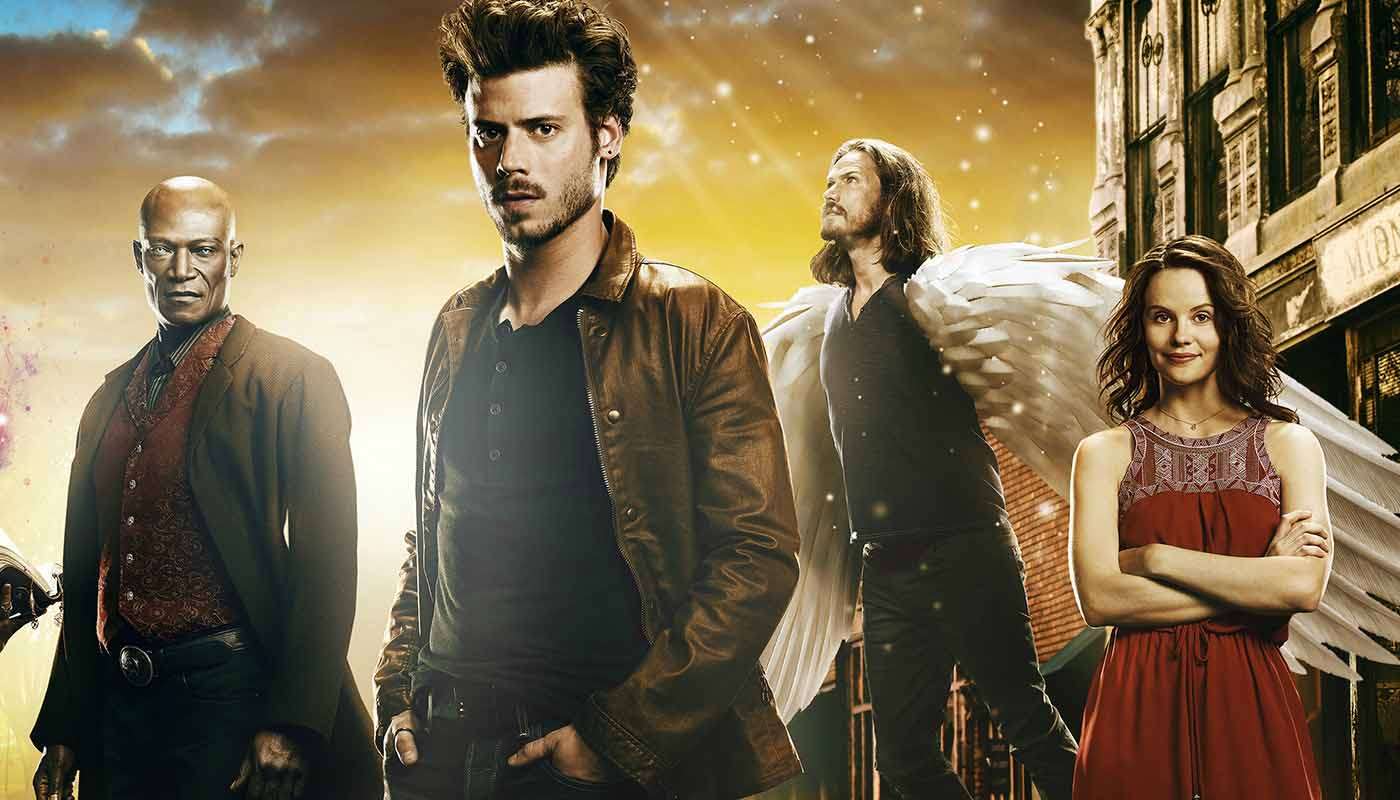Vampires and Spies Dominate Frothy Fun Television Choices
Charlaine Harris' books come to NBC while Russian agents invade CNN.


Declassified: Untold Stories of American Spies. CNN. Saturday, July 22, 9 p.m.
Midnight, Texas. NBC. Monday, July 24, 10 p.m.
It's the time of the television year, safely past the May upfronts where all of next season's advertising is sold and just before the big promotional push for the fall shows begins, when all the TV bosses flee for a few weeks to Malibu or the Hamptons or wherever it is that wealthy, imperious swine go to exchange tips on the most satisfying ways to whip the household help. And while the cat's away, the junior programmers will play, unleashing hordes of vampires, spies and what-have-you who would never see the airwaves if the grownups were around.
The result is usually shows that are kind of fun if not necessarily any good. Which is a pretty fair summary of the week's premieres: NBC's pleasingly trashy spook opera Midnight, Texas; and the CNN spy documentary Declassified: Untold Stories of American Spies, which is either a carefully coded revelation about American espionage or mammothly incompetent documentary filmmaking, take your pick.
Midnight, Texas, is based on a series of books by Charlaine Harris, who authored the vampire novels that became HBO's epic True Blood. But if you're expecting a True Blood clone, you're going to be wildly disappointed; the two series of books are completely different.
True Blood was about life in a creepy little Louisiana town populated mostly by vampires, werewolves, and telepathic fairies. Whereas Midnight, Texas, is about a creepy little Texas town populated mostly by vampires, werewolves, and telepathic gypsy psychics. So, we're on, like, different sides of the moon here, or at least different sides of the Sabine River.
Actually, the major difference in the two is the absence this time around of executive producer Alan Ball, who picked up one of the True Blood novels to pass the time after showing up early for a dentist's appointment and somehow divined in its pulpy goth confusion a tool with which to slice and dice culture, theology, sexuality, identity politics, and gender migration.
Whereas Midnight, Texas, is about biting people.
Just as the mind-reading waitress Sookie Stackhouse turned the ignition key in True Blood, ghost-whispering medium Manfred (François Arnaud, The Borgias) sets off the sparks in Midnight, Texas. Manfred's act is mostly fake, though he does occasionally hook up with a real spirit, almost always with disastrous results. Under pursuit by somebody he conned, he heads for tiny middle-of-nowhere Midnight, a place his grandmother—she's dead, but still full of the bad ideas that got her killed—tells him would make a good hideout.
It turns out Grandma wasn't the first one to have the idea. Most of Midnight's population share allergies to garlic, wolfsbane, and silver bullets. The preacher (Yul Vazquez, Captain Phillips) gets a bit growly during full moons. The nightshift clerk at the pawnshop (Peter Mensah, True Blood) is friendly, but never seems to be around during the daytime. And then there's that mysterious shopkeeper Fiji (Parisa Fitz-Henley, Luke Cage). "Some people say she's a witch," a local cop warns Manfred. "Or a lesbian." Even the town cat has a lot more on his mind than mice.
Midnight's unusual demographics are due in part to its metaphysical geography. "The veil between the living and the dead is awful thin here," one local explains to Manfred. (Go ahead, insert your own George Bush/Ted Cruz punchline here.) Not only that, they turn out to be an unruly lot, popping the veil at the slightest provocation, to drip (no, you don't want to know what) on the carpet, introduce their pet demons, and so forth.
Add to that the problems with the town's non-metabolically-challenged citizens, who include a motorcycle gang whose comportment can be deduced by its name, Sons of Lucifer, and an overachieving professional hitwoman (Arielle Kebbel, Ballers) whose signature line is "I need ammo," and you can see how an ectoplasmic repair guy like Manfred would stay busy.
He scarcely even has time to woo that cute bartender Creek, who is so resolutely normal that you know she must be keeping a secret. Creek is played by Sarah Ramos (Parenthood) in a long overdue lead role. Ramos has an enormous emotional range, both dramatic and comic. She doesn't get to do anything here quite as funny as her scene on the old NBC family drama American Dreams, when as a primly nerdy young teenager she goes on the American Bandstand rate-a-record panel and dings Satisfaction for bad grammar. But she's a lot of fun to watch.
Which is probably a good summation of Midnight, Texas. It's too loud and dumb to be really called good, but any fan of vampires, were-tigers or gaseously bloated corpses is going to have a fine time with it. And the show has an endearingly goofy sense of humor, particularly in its portrayal of cops, who are always doing stuff like invoking their constitutional right to search a home without a lot of annoying paperwork if the occupant looks weird. Crimestoppers Tip No. 1208-B: Warrantless searches of werewolf lairs during the full moon are not advised.
The shapeshifters in CNN's documentary series Declassified: Untold Stories of American Spies don't necessarily wait for the full moon. The episode kicking off the show's second season deals with deep-cover Russian moles of the type you see in FX's tantalizing spy drama The Americans, married couples raising kids in the burbs while keeping their Boris-and-Natasha instincts deeply closeted.
In fact, the 2010 case that Declassified recounts—the arrest of 10 Russian agents working without official cover, the kind Moscow spymasters refer to as "illegals"—probably provided a good deal of the inspiration for The Americans. Like the fictional Elizabeth and Phillip Jennings, these spooks strictly avoided the Russian embassy and fanned out across the country, working not in national-security sensitive jobs but as newspaper editors and adjunct professors at small colleges, spending years establishing cover identities that they hoped would stand up later under close scrutiny.
Relying heavily on interviews with FBI officials who don't seem entirely comfortable on camera, Declassified starts slowly, with frequent and tedious invocation of the phrase, "We can't reveal that."
But it picks up speed as it moves along. There are fascinating nuggets of espionage tradecraft (popular technique used to detect surreptitious entry into their homes: exit by walking backward, vacuuming as they go, to leave the carpet fluffy and undisturbed), epic spy fails (one couple kept all their secret messages and decoding keys in a single shoebox, making it easy-peasy for FBI burglars to grab and copy it) and considerable debunking of the idea that espionage is a glamorous Bondian whirl of cocktails and cuties. One wiretap captured a wife nagging her husband to pick up a child at school. I'm too busy, he protested, while the FBI agents listening clearly heard an episode of The Sopranos on the TV in his living room.
In the end, however, the most interesting part of Declassified is what it doesn't say. What tipped the FBI to the presence of the spies in the first place, making them put the 10 people under surveillance? And then there's the matter of the 11th spy, the only real Moscow-trained professional of the bunch, who lived somewhere abroad but regularly entered the United States to tour the country dispensing cash and equipment to the others.
At the FBI's request, he was arrested in Cyprus on the same day as the rest of the spies—but promptly released on bail, after which he vanished. There's scarcely a mention of this in Declassified. Was the 11th man actually an American mole inside Russian intelligence, spilling Moscow's secrets when they thought he was stealing ours? No word on that from Declassified. Maybe we'll learn more from the next season of The Americans.


Show Comments (13)